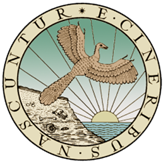Institute of Paleobiology, PAS

Name: Institute of Paleobiology, PAS
Address: ul. Twarda 51/55, 00-818 Warsaw, Poland
Website: http://www.paleo.pan.pl
Description:
Since its founding in 1952, the Institute of Paleobiology has advanced its mission to understand the fossil record as a foundation of knowledge about the history and evolution of the living world. The Institute encompasses a rich diversity of scientific expertise that ranges from descriptions of fossil biota (vertebrates, invertebrates, plants, and microfossils of various origins) to interdisciplinary research at the interface of biology, geology, and related fields. Particularly relevant from the present day perspective of climate variability and change are the broad questions addressed in Institute's research that include how the environmental change, measured over millions of years, can drive biological evolution, and how evolution may also affect environmental conditions. The Institute is renowned for its paleontological collections acquired during expeditions organized in Poland and in various areas of the world (Mongolia, Spitsbergen, Antarctica). Small part of this natural heritage is available for public as exhibitions of the Institute's Museum of Evolution, thereby creating an awareness of the fundamental principles underlying the evolution of life on Earth. The Institute publishes two international scientific periodicals: the Acta Palaeontologica Polonica quarterly (listed in SCI) and Palaeontologia Polonica (monograph series, since 1929).
Disciplines: Earth and Environmental Sciences
Fields of activity:
- Functional and evolutionary morphology, and paleobiology of invertebrates and vertebrates ;
- Biomineralization processes in space and time;
- Evolution of benthic (including chemosynthesis-based ) and nektonic ecosystems;
- Paleoclimatic and environmental changes (including Arctic and Antarctic regions);
- Biosedimentology and paleogeomicrobiology.
Latest achievements:
Over last 10 years our researchers published several publications in high-profile journals (including Science, Science Advances, Nature, Nature Communications, Proceedings of the National Academy of Sciences USA, Geology, Proceedings of the Royal Society B, Precambrian Research) addressing, among others, problems of earliest evidence of life on Earth, origin and evolution of vertebrates, paleoneurobiology of mammals, and the emergence of the coral reefs and evolution of biomineralizing organisms. The Institute is proud of ongoing excavations programs in various localities in Silesia (Triassic vertebrates) and in central Poland (exceptionally well-preserved Late Jurassic marine fossils).
Research facilities:
Institute of Paleobiology has a wide variety of traditional and modern laboratories including: (1) Laboratories of Cathodoluminescence Microscopy (hot cathode) and (2) Microtomography (Zeiss XRadia MicroXCT-200, submicrometric resolution), (3) 3D Laboratory, (4) Electron Microscopy and Electron Microprobe Laboratory (Philips FEI XL-20, and FE-SEM in purchase), (5) thin section and preparatory laboratories. The Library houses the largest collection of paleontological books and periodicals in Poland.
Contact person :
Professor Przemysław Gorzelak
Deputy Director for Research
pgorzelak@twarda.pan.pl
(+48 22) 69 78 885
